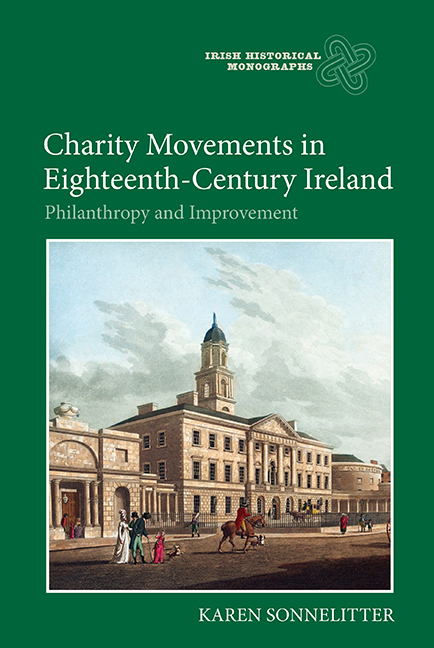Book contents
- Frontmatter
- Dedication
- Contents
- List of Figures
- Acknowledgements
- Abbreviations
- Introduction: Ireland in the Eighteenth Century: The Case for Improvement
- 1 ‘The Worst in Christendom’: The Church of Ireland and Improvement
- 2 Education and Charity: The Incorporated Society for Promoting English Protestant Schools in Ireland
- 3 To Cure and Relieve: Voluntary Hospitals in Eighteenth-Century Dublin
- 4 Improvement as Philanthropy: The Royal Dublin Society
- 5 ‘The Benevolent Sympathies of the Female Heart’: Women, Improvement, and the Work of Lady Arbella Denny
- 6 National and Local Government and Improvement
- Conclusion: Philanthropy and Improvement in Eighteenth-Century Ireland and Beyond
- Bibliography
- Index
5 - ‘The Benevolent Sympathies of the Female Heart’: Women, Improvement, and the Work of Lady Arbella Denny
Published online by Cambridge University Press: 11 May 2021
- Frontmatter
- Dedication
- Contents
- List of Figures
- Acknowledgements
- Abbreviations
- Introduction: Ireland in the Eighteenth Century: The Case for Improvement
- 1 ‘The Worst in Christendom’: The Church of Ireland and Improvement
- 2 Education and Charity: The Incorporated Society for Promoting English Protestant Schools in Ireland
- 3 To Cure and Relieve: Voluntary Hospitals in Eighteenth-Century Dublin
- 4 Improvement as Philanthropy: The Royal Dublin Society
- 5 ‘The Benevolent Sympathies of the Female Heart’: Women, Improvement, and the Work of Lady Arbella Denny
- 6 National and Local Government and Improvement
- Conclusion: Philanthropy and Improvement in Eighteenth-Century Ireland and Beyond
- Bibliography
- Index
Summary
On the morning of 18 March 1792 Mrs Meliore Adlercron of Dawson Street, Dublin, wrote in her book of household accounts, as indeed she did almost every day. This entry, though, was considerably different from most. Instead of her usual dry recitations of household expenses she wrote sadly regarding the death of a dear female friend. She referred to her friend as a ‘saint’ and recounted the friend's last visit, wherein she had laid her hands on the heads of Adlercron's children, blessing them. Adlercron felt that her friend was fortunate to be ‘translated from this world of woe and wickedness to the unspeakable delights of bliss of an eternal one which is prepared for the spirits of the just made perfect’. There was no question in Adlercron's mind that her friend would be admitted to paradise. She was cordial and kind; ‘her manners endeared her to all, the strength of her understanding the goodness of her heart of the multitude of virtues with which it was fraught made her the admiration of the age she lived may all those I love strive to imitate her lovely example’. Adlercron's only regret was that her own ‘great imperfections’ made it unlikely she would see her again in the ‘next world’.
The woman of whom Adlercron wrote so highly, who seemed to embody every imaginable virtue, was Lady Arbella Denny, who had died that day at the age of eighty-five. Adlercron was not unique in her reverence for Denny, who genuinely did have the ‘admiration of the age’. The reason that Denny was the object of so much appreciation was her extraordinary devotion to charity work. She spent years of her life working to improve conditions at the Dublin Foundling Hospital and went on to help found the Dublin Magdalene Asylum for Penitent Women, but did not limit herself to these projects. She was also interested in the broader improvement of Ireland. She became an honorary member of the Royal Dublin Society and was a patroness of the Irish silk warehouse. Her charity work united the principles of both philanthropy and improvement.
- Type
- Chapter
- Information
- Charity Movements in Eighteenth-Century IrelandPhilanthropy and Improvement, pp. 122 - 145Publisher: Boydell & BrewerPrint publication year: 2016

